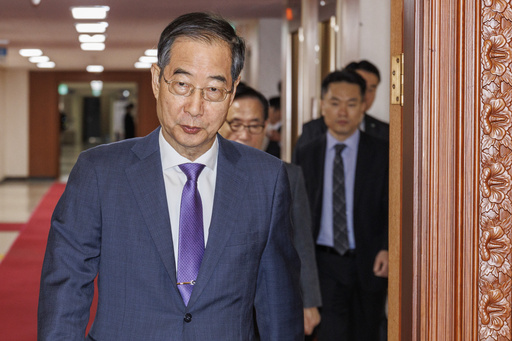SEOUL, South Korea (AP) — South Korea’s prime minister and senior presidential officials offered to resign Thursday after their ruling party suffered a crushing defeat in parliamentary elections in a blow to conservative President Yoon Suk Yeol.
The results of Wednesday’s elections mean the liberal opposition forces will prolong their control of parliament until after Yoon completes his single five-year term in 2027. That will likely set back Yoon’s domestic agenda and weaken his grip on the ruling party as he faces the opposition’s intensifying political offensive during his remaining three years in office, experts say.
Prime Minister Han Duck-soo and all senior presidential advisers to Yoon, except those in charge of security issues, expressed their intentions to resign, according to Yoon’s office. It didn’t immediately say whether Yoon accepted their resignations.
Executive power in South Korea is heavily concentrated in the president, but the prime minister is the No. 2 official and leads the country if the president becomes incapacitated.
Yoon said he will “humbly uphold” the public sentiments reflected in the election outcome and focus on improving people’s economic situations and reforming state affairs, said presidential chief of staff Lee Kwan-seop, in a televised briefing. Lee said he also offered to quit.
In a separate news conference, ruling People Power Party leader Han Dong-hoon said he would step down as well to take responsibility for the election defeat.
“I apologize to the people on behalf of our party, which wasn’t good enough to win the people’s choices,” he said.
With all the votes counted, the main opposition Democratic Party and its satellite party won a combined 175 seats in the 300-member National Assembly. Another small liberal opposition party obtained 12 seats under a proportional representation system, according to the National Election Commission.
Yoon’s People Power Party and its satellite party won 108 seats, the election commission said.
The final voter turnout for South Korea’s 44 million eligible voters was tentatively estimated at 67%, the highest for a parliamentary election since 1992, according to the election commission.
Regardless of the results, Yoon will stay in power and his major foreign policies will likely be unchanged. But the elections were widely seen as a midterm confidence vote on the former top prosecutor who took office in 2022.
Yoon has pushed hard to boost cooperation with the United States and Japan as a way to address a mix of tough security and economic challenges. But he has been grappling with low approval ratings at home and a liberal opposition-controlled National Assembly that has limited his major policy platforms that require legislative approvals.
Hong Sung Gul, a public administration expert at Seoul’s Kookmin University, said Yoon will likely find it more difficult to implement business-friendly policies and tax reforms, as the opposition parties are likely to aggressively flex their legislative muscles.
“When it comes to policies, important ones like tax system reforms require legislation. I think there is a high possibility for the opposition parties to put a break on Yoon’s such policy agendas,” Hong said.
Yoon’s critics have accused him of failing to resolve livelihood issues such as soaring prices, refusing to quickly fire some top officials implicated in scandals, and lacking efforts to communicate with opposition leaders for policy coordination.
Earlier this year, Yoon briefly enjoyed rising approval ratings over his strong push to drastically increase the number of medical students despite vehement protests by incumbent doctors. But the doctors’ walkouts eventually left Yoon facing growing calls to find a compromise, with patients and others experiencing delays of surgeries and other inconveniences.
The rival parties’ campaigning ahead of the elections deepened South Korea’s already serious conservative-liberal divide as they exchanged toxic rhetoric.
Democratic Party leader Lee Jae-myung lost the 2022 presidential election to Yoon in the country’s most closely fought presidential contest. During that race, Yoon and Lee and their supporters spent months demonizing each other.
Lee is eyeing another presidential bid. His main potential conservative rival is Han, who also served as Yoon’s justice minister. Lee faces an array of corruption investigations that he argues are politically motivated and pushed by Yoon’s government.
“The results of the parliamentary elections are not the victory by the Democratic Party, but the great victory by our people,” Lee said Thursday. “Now, the elections are over. Both the ruling and opposition political parties must pull together all their strength to resolve economic and public livelihood problems.”
The incoming parliament is to begin meeting on May 30 for a four-year term. Of the 300 seats, 254 were elected through direct votes in local districts, and the other 46 by the parties according to their proportion of the vote.
___
Associated Press writer Jiwon Song contributed to this report.


